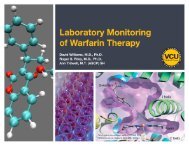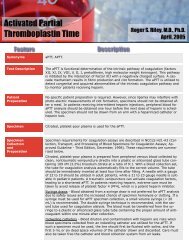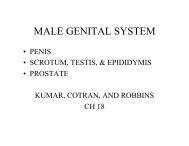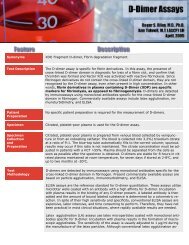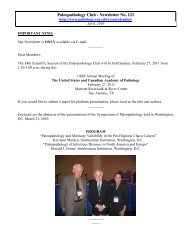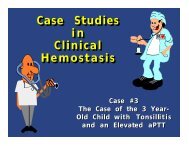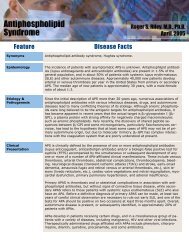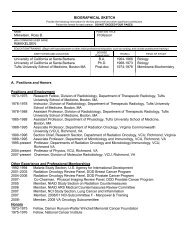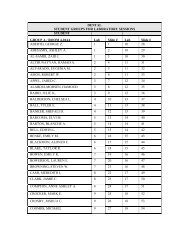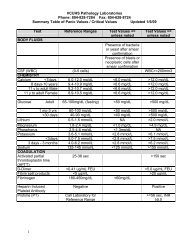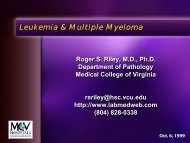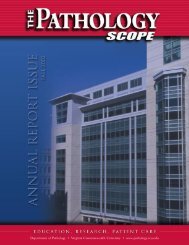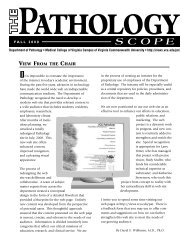Acknowledgements - Pathology - Virginia Commonwealth University
Acknowledgements - Pathology - Virginia Commonwealth University
Acknowledgements - Pathology - Virginia Commonwealth University
You also want an ePaper? Increase the reach of your titles
YUMPU automatically turns print PDFs into web optimized ePapers that Google loves.
V<br />
IEW<br />
FROM THE CHAIR<br />
Those familiar with the <strong>Pathology</strong> Scope will recognize that this issue represents a slight departure from our usual<br />
presentation of news and information about the Department of <strong>Pathology</strong>. We would like this edition of the<br />
newsletter to serve as an “Annual Report” of sorts, to share with our readers some of our accomplishments during<br />
the last fiscal year and some of our goals for the upcoming year. As you know, we are a large and diverse department,<br />
with overlapping enterprises in education, research, and clinical service. During the past year, we have made<br />
significant progress in all of these areas.<br />
Our department is recognized throughout the VCU Health System for excellence in teaching, for providing<br />
outstanding diagnostic and laboratory service to our patients and physicians, and for strong programs of sponsored<br />
research. Our stewardship over the VCUHS Clinical Laboratories is well recognized. The responsiveness of our<br />
physicians to clinical needs sets the standard for consultation in this medical center. Our funded research enterprise<br />
is growing. We have cutting edge programs in cancer research, functional genomics and proteomics. We recently<br />
opened one of the largest and most sophisticated university-based molecular diagnostics laboratories in the country.<br />
Our physicians and scientists are leaders in setting national and international practice standards in surgical pathology,<br />
cytopathology, transfusion medicine, hematology, microbiology, clinical chemistry, and toxicology.<br />
As an example of our national and international recognition, <strong>Pathology</strong> faculty members co-edited and contributed<br />
generously to the two major textbooks used by practicing pathologists today, “The Principles and Practice of Surgical<br />
<strong>Pathology</strong>” and “Clinical Diagnosis and Management by Laboratory Methods”. Whenever national pathology<br />
meetings are held, our faculty are always present on the programs. In the past three years, the VCUHS has invested<br />
over ten million dollars in our department to support our Functional Genomics Program, a new laboratory<br />
information system, a new Molecular Diagnostics laboratory, and space in the Gateway Building which will house<br />
Surgical and Cytopathology and Transfusion Medicine.<br />
These investments would never have materialized without a demonstrated pattern of continued success at all levels.<br />
This success would not be possible without the dedication and professionalism of our outstanding faculty members,<br />
residents, technologists, directors, managers, supervisors, and employees at every level. Because of our vitality and<br />
commitment to the highest standards of excellence, we continue to attract the best and brightest people to our<br />
programs. It is my pleasure and privilege to serve this department as chairman, and I wish to acknowledge and thank<br />
each and every person associated with the Department of <strong>Pathology</strong> for their commitment.<br />
David S. Wilkinson, M.D., Ph.D.<br />
Professor and Chairman<br />
Administrator’s Corner<br />
<strong>Pathology</strong> at VCU ended the last academic and fiscal year<br />
in good standing. Our finances remain solid and we are<br />
moving forward in many areas. But our work life, much<br />
like our home life, is filled with change and pluses and<br />
minuses. Over the past year the department saw several<br />
faculty members leave and move on to other opportunities.<br />
Many <strong>Pathology</strong> staff members, clinical, non-clinical and<br />
administrative, also departed our midst. Those of us who<br />
remain frequently have to fill those holes. But such is the<br />
nature of our profession and academic medical centers in<br />
general. Nothing stays the same for very long. This<br />
churning of faculty and staff, moreover, gives us the<br />
opportunity to be reborn every now and again, as we<br />
grow and evolve into something new and hopefully<br />
something much better. Our outlook as we enter<br />
another year of great change must be positive. As new<br />
faculty and staff join us they will bring a wealth of new<br />
ideas and perspectives that we can meld with our existing<br />
strengths. We will emerge stronger and better. Our<br />
vision is “to become a preeminent Department of<br />
<strong>Pathology</strong> in the United States.” And every time we<br />
search for someone new to join us we take a step closer<br />
to realizing that vision.<br />
Jeffrey Casterline<br />
Administrator<br />
• 1 •
Overall Accomplishments for Fiscal Year 2001<br />
• The Department continues to engage the faculty and executive management in an ongoing Strategic Planning program<br />
which most recently developed a comprehensive plan for a strengthened and integrated research enterprise.<br />
• The Cerner Laboratory Information System became fully operational in a live environment, giving the Department<br />
of <strong>Pathology</strong> a powerful tool for clinical testing and specimen processing.<br />
• Our faculty were extremely productive, providing a total of 964 formal contact hours and 1242 lecture contact hours<br />
within the School of Medicine. Their scholarly productivity included 64 peer-reviewed publications, nine book<br />
chapters, one book, and 72 abstracts. They served on 26 editorial review boards and reviewed 355 manuscripts.<br />
• The newly redesigned <strong>Pathology</strong> web page won recognition with an “Honorable Mention for Best Departmental Web<br />
Page” at the <strong>Pathology</strong> Informatics Conference in Pittsburgh.<br />
Educational Accomplishments<br />
• The Department established an annual award for resident research.<br />
• We developed a new fellowship in Molecular Diagnostics<br />
• The resident evaluation process has been strengthened, with a faculty<br />
quarterly review now a routine part of the ongoing evaluation process.<br />
• Teaching materials have been upgraded and improved in the<br />
teaching labs.<br />
• Computer based instructional materials were developed for use on the internet and CD ROM.<br />
• Creation of a new <strong>Pathology</strong> web site greatly enhances our ability to provide online <strong>Pathology</strong> education. Web pages<br />
have been developed for medical and dental students. Syllabi, course materials, PowerPoint lectures, schedules, and<br />
laboratory images are published online. Online forms for evaluating the lab supplements are also available, and an<br />
online calendar is updated on a daily basis during lab weeks so that students have a convenient online reference for<br />
assignments and schedules.<br />
Research Accomplishments<br />
• Our research programs were strengthened with significant capital equipment acquisitions, including a MALDI mass<br />
spectrometer for analysis of proteins, the Affymetrix gene chip instrument, a tissue arrayer, a capillary electrophoresis<br />
instrument, and an automated sample preparation instrument.<br />
• Funded research projects with direct and indirect costs of $1,161,378 were in progress last year.<br />
• The Functional Genomics Program was established under the leadership of Joy L. Ware, Ph.D. with financial<br />
support from VCU, the School of Medicine, the Department of <strong>Pathology</strong>, and the Massey Cancer Center. This is<br />
a multidisciplinary, multi-departmental research program.<br />
Clinical Service Accomplishments<br />
• We opened a state-of-the-art Molecular Diagnostics Laboratory, a 6,000 square foot nucleic acid-based clinical testing<br />
facility in the Clinical Support Center.<br />
• We secured a commitment of space and completed blueprints for the relocation and expansion of Transfusion<br />
Medicine, Surgical <strong>Pathology</strong> and Cytopathology in the Gateway Building.<br />
• The Department completed the installation of the Cerner Millennium Laboratory Information System to support<br />
all areas of the anatomic and clinical pathology laboratories. We successfully implemented a conversion to the Cerner<br />
Blood Bank Millennium laboratory information system.<br />
... Continued<br />
• 2 •
• There was continued re-engineering, reorganization and consolidation of clinical laboratories including Specimen<br />
Processing, Toxicology, Clinical Chemistry, Special Studies, FIRM lab, and Histology. These moves were<br />
accomplished to better utilize space, staff, and instrumentation. These improvements also increased efficiency<br />
and reduced costs.<br />
• Our Outreach Program expanded significantly with an increase in net revenue of almost one million dollars.<br />
• We performed a comprehensive salary review of positions and salaries to address parity issues and create a more<br />
competitive recruitment position.<br />
• A pneumatic tube carrier plan was implemented to meet<br />
the evolving specimen delivery needs of the Emergency<br />
Department and the ICU.<br />
• Laboratory support was expanded for the new Oncology Clinic<br />
at Stony Point.<br />
• Inpatient phlebotomy was transferred to nursing units with the<br />
elimination of eight FTE’s.<br />
• Our clinical laboratories earned a two-year accreditation from<br />
the College of American Pathologists following a successful<br />
comprehensive inspection.<br />
VCU President Eugene Trani and Dr. David<br />
Wilkinson cut a ceremonial ribbon to dedicate the<br />
new Molecular Diagnostics Clinical lab<br />
Overall Goals for Fiscal Year 2002<br />
• The Department of <strong>Pathology</strong> will provide high-quality, cost-effective pathology services in a manner that supports<br />
the patient care, research, and education missions of the VCUHS Academic Medical Center and the <strong>Virginia</strong><br />
<strong>Commonwealth</strong> <strong>University</strong> School of Medicine.<br />
• The Department will continue to engage its faculty and managers in an ongoing strategic planning process to<br />
maintain a “living” and viable plan of operation in the critical areas of education, research, clinical service,<br />
and administration.<br />
• We intend to continue utilizing the latest technology to educate residents and medical students.<br />
Educational Goals<br />
Our goals in the area of education are to:<br />
• Strengthen the resident training curricula in anatomic pathology and clinical pathology by improving rotationspecific<br />
objectives, skills checklists, pre- and post-tests, case-based tutorials, didactic teaching methods, advanced<br />
rotations in specialty areas, and feedback mechanisms.<br />
• Improve performance in the resident match and attract an increased number of qualified resident applications.<br />
• Improve the effectiveness of pathology education to medical students by upgrading digital imaging and<br />
computer-based learning.<br />
• Expand and develop use of the internet for teaching and learning and to continue improving the educational<br />
content of the department’s web pages.<br />
• Explore and utilize new technologies in teaching.<br />
• 3 •
Research Goals<br />
Our goals in the area of research are to:<br />
• Develop an enhanced collaborative environment within <strong>Pathology</strong><br />
• Develop an infrastructure to facilitate research<br />
• Create a Grant Support mechanism<br />
• Hire a grant administrator, to be used as a shared <strong>Pathology</strong> resource<br />
• Educate faculty and residents in research and grantsmanship<br />
• Focus future faculty recruitment on research potential in basic, clinical and translational research<br />
• Add personnel to query and manage databases (programming and analysis), possibly at the faculty level<br />
• Provide leadership for the Cancer Genomics Initiative<br />
Clinical Service Goals<br />
In laboratory service, we intend to:<br />
• Implement two new clinical laboratories. An Ultra STAT Laboratory will reduce turnaround times for the Emergency<br />
Room and the ICU’s. A redesigned OR laboratory, with Novas interfaced to the Cerner LIS, will provide new<br />
hematology and coagulation testing.<br />
• Add new instrumentation and robotics in specimen processing and analytical areas of the laboratories to increase<br />
efficiency and decrease costs per test.<br />
• Develop and implement a Recruitment and Retention Plan to ensure staffing of the laboratories with personnel of the<br />
highest caliber. We will continue working with Human Resources to analyze and adjust salaries to foster a competitive<br />
position in the personnel market.<br />
• Successfully relocate Transfusion Medicine and Anatomic <strong>Pathology</strong> laboratories to the Gateway Building.<br />
• Expand Outreach Programs, including an Outreach billing system, with the intention of adding an additional one<br />
million dollars of net revenue to the hospital’s bottom line.<br />
• Improve billing and collection procedures.<br />
• Decrease billing errors.<br />
• Stabilize and improve transcription support by adding home transcription capability to the Surgical <strong>Pathology</strong><br />
laboratories.<br />
• Provide leadership in the implementation of the Clinical Information System utilizing experience gained in<br />
implementing the Cerner Laboratory Information System.<br />
Other Goals<br />
• Continuously improve communications, flow of information, and business practices.<br />
• Develop and implement uniform departmental administrative procedures.<br />
• Coordinate internal pathology functions between VCU Health Systems and <strong>Virginia</strong> <strong>Commonwealth</strong> <strong>University</strong><br />
policies and procedures.<br />
Progress will be made in all areas through the thoughtful and deliberate approach to problem solving in a<br />
collaborative environment.<br />
• 4 •
CLINICAL LABORATORY PERSPECTIVES<br />
The Clinical Laboratories of the Department of <strong>Pathology</strong><br />
have had a very successful year. We have seen an increase in<br />
testing volume and net revenue for the department, including<br />
nearly one million dollars of new Outreach revenue. Three<br />
new managers have joined our team, bringing strong leadership<br />
to help the laboratory operation move forward. We continue<br />
to improve the capabilities of our new Cerner Laboratory<br />
Information System (LIS), having recently added the Cerner<br />
Millennium in the Transfusion Medicine service. Two major<br />
challenges that we continue to face are “doing more with less”<br />
and increased competition for labor resources. We will<br />
continue to address these challenges with utilization of stateof-the-art<br />
instrumentation, automation, computers, and<br />
robotics. We are focusing on the needs of staff members by<br />
implementing a staff retention plan and making market<br />
adjustments in salaries to remain competitive. The major<br />
accomplishments for FY01 and the goals for FY02 give a<br />
snapshot of where we are going. We look forward to the<br />
challenges of this changing health care environment.<br />
Thomas Dilts<br />
Director of Laboratory Operations<br />
CTRF<br />
COMMONWEALTH TECHNOLOGY RESEARCH FUND<br />
<strong>Virginia</strong>’s <strong>Commonwealth</strong> Technology Research Fund (CTRF) will provide nearly 1 million dollars per year<br />
for three years to a consortium comprised of <strong>Virginia</strong> <strong>Commonwealth</strong> <strong>University</strong>, George Mason <strong>University</strong> and<br />
the Inova health care system to evaluate gene expression and genetic changes in human brain, ovarian, breast,<br />
and hemolymphocytic cancers. There will be linkage of gene expression data and genetic changes to clinical<br />
findings in a common database. The linked data will be evaluated using bioinformatics to identify new<br />
diagnostic markers and prognostic indicators in the aforementioned cancers.<br />
Dr. Carleton Garrett, Professor of <strong>Pathology</strong> and Chair of the Molecular Diagnostics Division has been selected<br />
to serve as Interim Project Director during the project’s first year. The Department of <strong>Pathology</strong> is primarily<br />
responsible for establishment of a tissue bank to support testing for changes in gene expression in the human<br />
tumors. It will acquire residual specimens from patients undergoing surgery for treatment of any of the<br />
specified tumors. The Molecular Diagnostics Laboratory will perform some testing of residual specimens.<br />
Funding to <strong>Pathology</strong> for this project will be in the amount of $273,436 for the first year, with a potential total<br />
of $605,402 for three years.<br />
Several of the Department’s faculty will be involved in establishing a Tissue Bank, developing databases,<br />
performing data analysis, and creating a Quality Assurance (QA) program. Drs. Kristen Atkins, Celeste Powers<br />
and Margaret Grimes will provide key support and leadership in establishing the Tissue Bank. Dr. Suhail Nasim<br />
will join the faculty in December to participate in this effort. Dr. Greg Miller, the Department’s director of<br />
<strong>Pathology</strong> Informatics will lead database development and data analysis efforts. Dr. Andrea Ferreira-Gonzalez<br />
will provide leadership in QA for monitoring these complex testing processes.<br />
“The CTRF Cancer Genomics Project provides the Department with a unique opportunity to develop<br />
infrastructure to support cutting edge research and to provide leadership in an important emerging area of<br />
clinical practice.” said Dr. Carleton Garrett, Interim Director of the CTRF Cancer Genomics Project.<br />
• 5 •
GATEWAY P R O G R E S S<br />
Work is progressing rapidly as the new Gateway Building<br />
nears completion. This is an especially exciting time for<br />
the Department of <strong>Pathology</strong> as we anticipate moving the<br />
Transfusion Medicine Service and the Surgical <strong>Pathology</strong><br />
and Cytopathology Laboratories into custom designed<br />
space in the Gateway Building. In addition to the<br />
advantages of working in new and modern space, these<br />
laboratories will benefit through improved process flow<br />
and quicker turnaround times.<br />
In the words of Judy Luck, Manager of our Anatomic<br />
<strong>Pathology</strong> labs, “The new Gateway space will place the<br />
laboratory closer to the patients we serve, most importantly<br />
in the OR. The open laboratory scheme will provide<br />
flexibility to reconfigure resources as needed. This open<br />
design will allow for ease in cross training laboratory staff,<br />
shared resources and reduced expenses.”<br />
SBRA Architects, Boston<br />
Transfusion Medicine patients will benefit as well. “It will be much more convenient for our patients to get to the<br />
apheresis area once we move. The clinical environment will be considerably more accessible, and the apheresis patients<br />
will have a less stressful experience,” according to Dr. Susan Roseff, Medical Director of Transfusion Medicine.<br />
We are extremely optimistic that our employees will enjoy the improved working conditions. “This new facility will<br />
provide a recruitment and retention tool for our current and new employees by providing a pleasant work environment<br />
and a smoother, more efficient work flow. We are always looking at how we are doing things and identifying areas for<br />
improvement, and the Gateway design allows this flexibility,” said Ms. Luck.<br />
If progress continues at its current pace, we hope to have our laboratories relocated and fully functional within the<br />
Gateway Building by early spring of 2002.<br />
HISTOLOGY LAB<br />
The Histology Lab has begun using the Artisan Staining<br />
System by Cytologix. This is the latest generation of<br />
staining automation, providing us with the flexibility of<br />
manual staining coupled with the precision and<br />
consistency of automation. The Artisan system is<br />
designed to perform multiple special staining procedures<br />
simultaneously, thus freeing up valuable technician time<br />
and decreasing turnaround times.<br />
F U N D E D R E S E A R C H<br />
In August, Dr.Alphonse Sirica was awarded<br />
a Merck Research Grant (MSGP#284c) in<br />
the amount of $50,000 to investigate<br />
cyclooxygenase-2 in human and rat biliary<br />
carcinogenesis. The period covered by this<br />
award is August, 2001 through July, 2002.<br />
• 6 •
MCVH Cytopathology To Offer Pap Smear Alternative<br />
The Department’s Cytopathology Lab will soon offer a liquid based monolayer technology as an alternative to the<br />
conventional pap smear. Tripath’s Autocyte PREP has been selected as the collection system to improve technology in<br />
the procurement and preparation of gynecologic specimens. Studies done in other institutions with Autocyte PREP<br />
have indicated increased sensitivity in the diagnosis of squamous intraepithelial lesions, while experiencing a decrease<br />
in unsatisfactory and less than satisfactory gynecologic samples. When compared to others, Autocyte’s stained<br />
preparations appear to more closely resemble conventional pap smears, while their enrichment process and differential<br />
centrifugation help eliminate obscuring material and increase the concentration of abnormal cells. In addition, Tripath<br />
has the only FDA approved automated screening system which can be directly linked with their monolayer<br />
preparation system. Preliminary studies have also indicated there is adequate residual specimen in Autocyte vials after<br />
processing to satisfy HPV hybrid capture studies, which can be used for additional testing. All these factors will<br />
enhance patient results and facilitate optimal care and management. Cytopathology has obtained the help of Amanda<br />
Richards, M.D., Co-Director of Women’s Health at Stony Point, an outreach facility of MCVH, in the collection of<br />
samples for the validation process with this new technology, which will be completed this year.<br />
Residents and Fellows<br />
The Department’s Residency Program and Fellowship<br />
Programs continued to provide outstanding<br />
educational opportunities for trainees during the<br />
academic year 2000-2001. Recent events have given<br />
faculty and house staff the chance to reflect on their<br />
accomplishments and plan for the future.<br />
On June 14, 2001, the annual Graduation Banquet<br />
was held at the Capital Club to honor those trainees<br />
finishing residencies, fellowships and doctoral<br />
programs. Faculty from each division joined graduate<br />
students and house staff in wishing “bon voyage” to<br />
those who were leaving the Department, or staying<br />
with the Department in new capacities after<br />
completing their educational programs. It is at this<br />
event that the Department also traditionally recognizes<br />
outstanding contributions to the Department’s<br />
educational mission. Historically, three awards have<br />
been bestowed; the Fergus O’M. Shiel Award for<br />
resident teaching excellence, the Charles W. “Buck”<br />
Moncure Autopsy Service Award, and the Saul Kay<br />
Award presented by graduating residents to the faculty<br />
member of their choice. This year, the Resident<br />
Research Award was added and will be given annually<br />
for outstanding resident work in scholarly activities.<br />
These awards were presented as follows:<br />
• Fergus O’M. Shiel Award - David Rowe, M.D.<br />
(presented by Dr. Enrique Gerszten and Dr. Angela<br />
Brosnan (Mrs. Fergus Shiel))<br />
• Charles W. “Buck” Moncure Autopsy Service Award<br />
- Rajat Goel, M.D. (presented by Dr. Nitya Ghatak)<br />
• Saul Kay Award - Barbara Amaker, M.D. (presented<br />
by 2000-2001 graduating residents)<br />
• Resident Research Award - Christine Cesca, M.D.<br />
(presented by Dr. Joy Ware)<br />
The banquet honored those who were completing their<br />
time in one role and moving on, here or elsewhere.<br />
Honorees were:<br />
• Eric Christiansen, M.D. finished his fellowship in<br />
Forensic <strong>Pathology</strong> and is now on staff with the Office<br />
of the Chief Medical Examiner in Richmond.<br />
• Mary Mainland, M.D. completed her fellowship in<br />
Forensic <strong>Pathology</strong> and is now on staff with the<br />
Medical Examiner’s Office of Milwaukee County,<br />
Wisconsin.<br />
• Kristen A. Atkins, M.D. finished her fellowship in<br />
Surgical and Cytopathology and joined the faculty of<br />
the VCU Department of <strong>Pathology</strong> as an Assistant<br />
Professor in the Division of Surgical and Cytopathology.<br />
• Lampros S. Karageorge, M.D. finished his fellowship<br />
in Surgical and Cytopathology and is now a<br />
Pathologist at the Veteran’s Affairs Medical Center in<br />
Roanoke, <strong>Virginia</strong>.<br />
• David Rowe, M.D. completed his residency training<br />
in Anatomic and Clinical <strong>Pathology</strong> and is now a<br />
Dermatopathology Fellow with the Armed Forces<br />
Institute of <strong>Pathology</strong> in Washington, D.C.<br />
• H. Davis Massey, D.D.S., M.D., Ph.D. finished his<br />
• 7 •
esidency training in Anatomic and Clinical <strong>Pathology</strong><br />
and is now an Assistant Professor in the VCU<br />
Department of <strong>Pathology</strong>’s Division of Surgical and<br />
Cytopathology.<br />
• Cindy L. Holmes, M.D. finished her residency program<br />
in Anatomic and Clinical <strong>Pathology</strong> is now a Surgical<br />
and Cytopathology Fellow with our Department.<br />
• Anna B. O’Grady, M.D. completed her residency in<br />
Anatomic and Clinical <strong>Pathology</strong> and is now a<br />
Molecular Diagnostics Fellow with our Department.<br />
• Priya Krishen, M.D. transferred to the Cleveland Clinic<br />
to finish her residency in Anatomic and Clinical<br />
<strong>Pathology</strong>.<br />
A short film produced by senior residents Rob Forsythe<br />
and Rajat Goel provided the evening’s entertainment.<br />
“I feel privileged to have been present during a crucial<br />
point in American cinematic history,” said one who was<br />
in attendance.<br />
The Department is also pleased to welcome new residents<br />
and fellows that began their training this year. Unless<br />
otherwise noted, all new house staff started with our<br />
Department on July 1. They are:<br />
• John Fernandes, M.D. - New Forensic <strong>Pathology</strong> Fellow<br />
• Matt R. Foster, M.D. - New Surgical and Cytopathology<br />
Fellow<br />
• Juan Perez-Berenguer, M.D. - Neuropathology Fellow<br />
(started January 1, 2001)<br />
• James Christian, M.D. (PGY-3) - New AP/CP Resident<br />
• Zach Ellis, M.D. (PGY-2) - New AP/CP Resident<br />
• Rob Franklin, M.D. (PGY-1) - New AP/CP Resident<br />
• Kim Sanford, M.D. (PGY-1) - New AP/CP Resident<br />
This year’s welcome picnic was held at Deep Run Park in<br />
Henrico County on Saturday, August 4th. The Chief<br />
Residents, Drs. Rob Forsythe and Dawn Pavot did an<br />
outstanding job in organizing the event and creating an<br />
atmosphere conducive to an enjoyable experience for all<br />
present.<br />
The Department’s Graduate Medical Education Programs<br />
continue to draw talented graduates from respected<br />
educational institutions. The collegial atmosphere that we<br />
create as a Department and the excellent education we are<br />
able to provide have distinguished the programs.<br />
Rob Ferguson<br />
Coordinator, <strong>Pathology</strong> Resident Training Program<br />
W<br />
elcome New Employees<br />
Please join us in welcoming the following new employees to the Department of <strong>Pathology</strong>, and help us<br />
make them feel at home in their new positions.<br />
Kwame Asante, Microbiology; Clarice Baker, Outreach; Lucy Boyd, Chemistry; Elijah Cheeks,<br />
Toxicology; James Ellis,Transfusion Medicine; Tony Ferrell, Hematology; Terisa Greene-Potter,<br />
Functional Genomics; Dan Holmes,Anatomic <strong>Pathology</strong>; Edward Jamelarin,Transfusion Medicine;<br />
Nadia Jones, Chemistry; Pamela Lewis, Hematology; Geraldine Lightfoot, Outreach; Donna<br />
Lightner, Microbiology; Sophie Liu, Functional Genomics; Megan Low, Microbiology; Rayette<br />
Maddox, Microbiology; Sylvia Makoge, Chemistry; Tina Mehta,Anatomic <strong>Pathology</strong>; Ian Moreno,<br />
Outreach; Kelly Perkins,Transcription; Robin Reynolds,Transcription; Damon Robinson, Outreach;<br />
Astrid Rogers,Transfusion Medicine; Trevia Strandberry, Specimen Processing; Anthony Stroud,<br />
Microbiology; Karen Tinsley, Client Services; Jeffrey Wellman,Transfusion Medicine.<br />
• 8 •
<strong>Pathology</strong> Grand Rounds<br />
<strong>Pathology</strong> Grand Rounds are held every Friday during the academic year at noon in Sanger Hall 4-026. We offer a<br />
diverse and distinguished lineup of guests this Fall speaking on a variety of relevant and timely topics. All are welcome<br />
to participate in this informative lecture series. Continuing Medical Education (CME) credits are available.<br />
DATE NAME ORGANIZATION TITLE<br />
9/ 7 Steven Sawyer, Ph.D. VCU Extracellular Signaling in Determining Survival vs.<br />
Apoptosis and Proliferation versus Differentiation in<br />
HematopoieticCells; Actions of EPO<br />
9/14 Shawn E. Holt, Ph.D. VCU Telomeres, Telomerase, and Human Cloning<br />
9/ 21 Glen E. Kellogg, Ph.D. VCU Understanding Biological Function One Molecule at a<br />
Time.The Role of Computational Chemistry and<br />
Molecular Modeling<br />
9/28 A. Scott Mills, M.D. VCU Hepatitis C: Grading, Staging, and Treatment<br />
Mitchell Schiffman, M.D.<br />
10/5 Carolyn A. Price, Ph.D. <strong>University</strong> of Cincinnati Telomeres and Telomerase Regulation<br />
10/12 Anthony Demetris, M.D. VCU The Role of IL-6 in Biliary Disease<br />
10/19 Irene Newsham, PhD Henry Ford Hospital, The Membrane Associated Protein DAL-1<br />
Detroit, Michigan<br />
Modulates Growth in Breast and Brain Tumors<br />
10/26 Raghu Mirmira, M.D., Ph.D. <strong>University</strong> of <strong>Virginia</strong> Transcriptional Regulation of Pancreatic Beta-Cell<br />
Differentiation<br />
11/2 Roger Dodd, M.D. American Red Cross, The Current State of Blood Safety<br />
Rockville, MD<br />
11/9 Jolene Windle, Ph.D. VCU Genetic Determinants of Tumor Properties in<br />
Transgenic Mice<br />
11/16 Dominique Broccoli, Ph.D. Fox Chase Cancer Center, Telomere Dynamics in Aging and Cancer<br />
Philadelphia<br />
11/23 Thanksgiving Holiday No Grand Rounds<br />
11/30 S. Perwze Hussain, Ph.D. National Cancer Institute P53 at the Cross Road of Molecular Carcinogenesis,<br />
Molecular Epidemiology and Human Risk Assessment<br />
12/7 Harold S. Kaplan, M.D. Columbia <strong>University</strong> Error Management<br />
12/14 George Vande Woude, M.D. Van Andel Institute, HGF/met in Human Malignancy<br />
Grand Rapids, MI<br />
AWARDS<br />
J. CLINTON BROWN AWARD<br />
Kathy Corker, MT Senior in the Department of <strong>Pathology</strong>’s Hematology Lab, recently received the J. Clinton Brown<br />
award. This award recognizes the clinical instructor who best demonstrates outstanding teaching abilities and contributions<br />
to the education of CLS students during their clinical rotation at MCVH. The recipient of this annual award is chosen by<br />
the CLS graduating class. Congratulations to Ms. Corker for this unique honor.<br />
RSCLS AWARD OF MERIT<br />
Ann Tidwell, MT Senior in the Hematology Lab, received the 2001 RSCLS Award of Merit. The Richmond Society of<br />
Clinical Laboratory Scientists Award of Merit is awarded biannually. Nominations are solicited from the membership. The<br />
award recognizes a distinguished member who has given of his or her time and talent to further the professional goals of the<br />
society. Congratulations to Ms. Tidwell for her accomplishments.<br />
• 9 •
Faculty Notes<br />
Lisa A. Weymouth, Ph.D. earned academic promotion to the rank of Associate Professor of <strong>Pathology</strong> effective July 1, 2001.<br />
In August, Dr. Weymouth retired to Key West, Florida. We thank her for her many contributions to the Department and<br />
wish her the best in her retirement.<br />
H. Davis Massey, D.D.S., M.D., Ph.D. joined the faculty of the Department of <strong>Pathology</strong> at the rank of Assistant Professor.<br />
Dr. Massey recently completed his combined AP/CP residency training in the Department of <strong>Pathology</strong>.<br />
Kristen A. Atkins, M.D. joined the faculty of the Department of <strong>Pathology</strong> at the rank of Assistant Professor. Dr. Atkins<br />
recently finished her Cytopathology Fellowship in the Department of <strong>Pathology</strong>.<br />
Alphonse E. Sirica, Ph.D. was the Organizer and Chair of a FASEB Summer Research Conference on Growth Factor<br />
Receptor Tyrosine Kinases in Mitogenesis, Morphogenesis, and Tumorigenesis held in Snowmass Village, Colorado August 4-<br />
9, 2001. This International Conference was sponsored by the Federation of American Societies for Experimental Biology and<br />
was supported in part by a NIH Conference Grant (Principal Investigator: A.E.Sirica) from the National Cancer Institute.<br />
In June, 2001, Dr Sirica chaired and presented in a Session entitled “Malignant Transformation of Cholangiocytes” at the<br />
American Association for the Study of Liver Diseases Single Topic Conference entitled “The Pathobiology of Biliary<br />
Epithelia”. This International Conference was held at the Airlie Conference Center in Warrenton, <strong>Virginia</strong> June 7-10, 2001.<br />
CLINICAL LABORATORY SCIENCES<br />
Once again, graduates of the Clinical Laboratory Sciences<br />
(CLS) program at the Medical College of <strong>Virginia</strong><br />
Campus of <strong>Virginia</strong> <strong>Commonwealth</strong> <strong>University</strong> achieved<br />
outstanding success on the American Society of Clinical<br />
Pathologists (ASCP) Board of Registry Medical<br />
Technologist Certification Examination. Of the examinees<br />
tested in the most recent examination cycle, six of the top<br />
twenty scoring individuals in the nation, including the<br />
highest score, were graduates of the CLS program at<br />
VCU. The individuals and their rank are as follows:<br />
Anthony Stroud Placed 1st<br />
Donald Bowling Placed 5th<br />
Megan Low Placed 6th<br />
Justin Dalton Placed 14th<br />
Jennifer Runion Placed 18th<br />
Shari Scott Placed 19th<br />
In addition to these six individuals, the entire CLS graduating<br />
class of 2001 deserves recognition. The ASCP certification<br />
examination is highly competitive with only 78%<br />
of the examinees attaining a passing score during the period<br />
of this review. The CLS class of 2001 from VCU not<br />
only surpassed this passing rate, but three-quarters of the<br />
class scored higher than the average score of all first time<br />
candidates nationwide. In fact the cumulative program<br />
mean was 69 points above the national average. Please<br />
join in extending our congratulations and best wishes to<br />
all of these very talented new laboratorians.<br />
In Remembrance<br />
Robert Kevin Brown, Medical Technologist<br />
in the Specimen Processing area, passed away<br />
on July 9, 2001. Mr. Brown, born June 2,<br />
1955, was a twenty five year employee of<br />
MCV Hospitals. The fifth of seven children<br />
of the late Paschal and Lorraine Brown, he<br />
was a graduate of John Marshall High<br />
School in Richmond, <strong>Virginia</strong> where he was<br />
captain of the cadet corps. He was a devoted<br />
member of the music ministry and the usher’s<br />
ministry at Trinity Baptist Church. Mr.<br />
Brown will be remembered as a dedicated<br />
employee and a devoted co-worker. His<br />
positive attitude and encouraging demeanor<br />
will be sadly missed by his many friends here<br />
in the Department of <strong>Pathology</strong>.<br />
• 10 •
<strong>Acknowledgements</strong><br />
Thank you to the following individuals for contributing to this issue of the <strong>Pathology</strong> Scope:Violet<br />
Brown, Jeffrey Casterline,Thomas Dilts, Rob Ferguson, Enrique Gerszten, Margaret Grimes,Ann<br />
Harris, Shawn Holt, Pat Johnson, Garry Land, Barbara Lindsey, Judy Luck, Mary Ann Pedigo, Debbie<br />
Reynolds, Carol Rodgers, Susan Roseff,Alphonse Sirica, Joy Ware, and David Wilkinson<br />
Your Contributions are Encouraged<br />
Please send news and information to:<br />
Larry Vetter<br />
Editor<br />
The <strong>Pathology</strong> Scope<br />
P.O. Box 980662<br />
Richmond,<strong>Virginia</strong> 23298-0662<br />
lpvetter@hsc.vcu.edu



